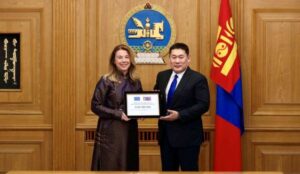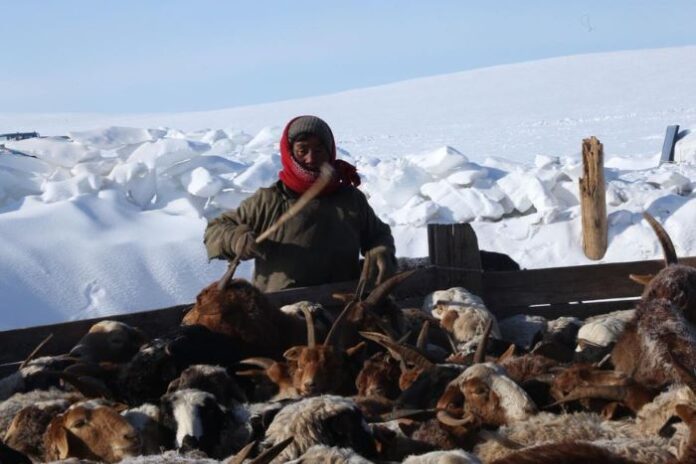Dzud is a type of winter weather that occurs mainly in the steppe regions of Central and Eastern Asia. This phenomenon causes deep snow, severe cold, or other conditions that make it difficult for animals to find food. It can lead to a high mortality rate among livestock and threaten human lives by making travel and transportation impossible. During a Dzud, food, drink, fuel, medicine, and other necessities quickly become unavailable for some time, which can be longer than the regular supply reserves of households.
Dzud is particularly severe in Mongolia. In February 2024, 80% of Mongolia experienced a Dzud disaster, affecting 13 provinces, according to reports from the National Agency of Meteorology and Environmental Monitoring (NAMEM) of Mongolia. A report issued by the National Emergency Management Agency (NEMA) on 26 February revealed that livestock losses reached 2.3 million, an 86% increase compared to last year.
Dzud is a disaster because it affects the livestock populations that support the livelihoods of a third of Mongolia’s population and impacts the national economy. Although it’s not a regular occurrence, scientists have seen changes in regional climate over the past 60 years and predict that Dzud will likely become more frequent and severe with future atmospheric changes.
This year, animal mortality is expected to reach devastating numbers. Additionally, records warn that a tough spring will likely follow, with storms, blizzards, and floods causing a late arrival of fresh grass. Herders need help approaching the offspring season and preparing for weakened survivor herds following the Dzud disaster.
EU assistance
The European Union has made €500,000 (MNT 1.85 billion) available in response to severe winter conditions in the country.
In a meeting on March 14 between the EU Ambassador to Mongolia, HE Axelle Nicaise, and the Prime Minister of Mongolia, Oyun-Erdene Luvsannamsrai, the Ambassador handed over the agreement to provide humanitarian assistance. The Prime Minister expressed his gratitude on behalf of the Government and people of Mongolia for the EU support to Mongolia in times of challenge and need.

[© THE GOVERNMENT OF MONGOLIA, 2024]
“The European Union, as Mongolia’s third neighbour, demonstrates once again its solidarity with the people of Mongolia in this trying time. We trust that our contribution will help the herders recover and build further resilience and a more sustainable model of herding,” stated Ambassador Axelle Nicaise.
“The Dzud in Mongolia this year also confirms the urgency to put in place long term decisive actions to fight the effects of climate change and decrease the frequency of natural disasters. In this year where the EU and Mongolia celebrate 35 years of diplomatic relations, we will pursue our strong partnership and dialogue with the GoM on all these crucial issues,” she added.
During the meeting, the two sides discussed the possibility of expanding trade and economic cooperation between the EU and Mongolia. They emphasised the importance of effectively celebrating the 35th anniversary of establishing diplomatic relations between Mongolia and the European Union. Recent development includes the signing of the first tranche of a concessional loan of EUR 45 million from the European Investment Bank (EIB), a grant of EUR 9.4 million from the European Union for the “Aimags and Soums Green Regional Development Investment Program (ASDIP)” and a MoU on Forestry between EIB and Ministry of Environment and Tourism in Mongolia.
The two sides also discussed ongoing and future projects and programmes as part of Mongolia’s long-term development policy, Vision 2050, “New Revival Policy,” the EU’s Global Gateway, and the Green Deal. The European Union will provide humanitarian assistance through the Mongolian Red Cross Society (MRCS) to 1,850 herder families in dire need by supplying cash, hay, and fodder packages.

